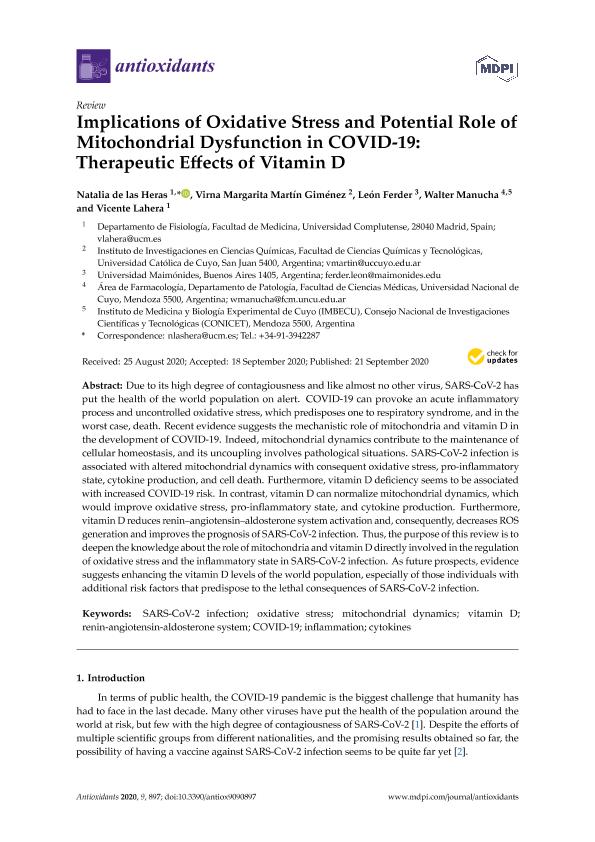Mostrar el registro sencillo del ítem
dc.contributor.author
de Las Heras, Natalia

dc.contributor.author
Martín Giménez, Virna Margarita

dc.contributor.author
Ferder, León
dc.contributor.author
Manucha, Walter Ariel Fernando

dc.contributor.author
Lahera Juliá, Vicente

dc.date.available
2020-10-07T16:06:26Z
dc.date.issued
2020-09
dc.identifier.citation
de Las Heras, Natalia; Martín Giménez, Virna Margarita; Ferder, León; Manucha, Walter Ariel Fernando; Lahera Juliá, Vicente; Implications of Oxidative Stress and Potential Role of Mitochondrial Dysfunction in COVID-19: Therapeutic Effects of Vitamin D; MDPI; Antioxidants; 9; 9; 9-2020; 1-21
dc.identifier.issn
2076-3921
dc.identifier.uri
http://hdl.handle.net/11336/115544
dc.description.abstract
Due to its high degree of contagiousness and like almost no other virus, SARS-CoV-2 has put the health of the world population on alert. COVID-19 can provoke an acute inflammatory process and uncontrolled oxidative stress, which predisposes one to respiratory syndrome, and in the worst case, death. Recent evidence suggests the mechanistic role of mitochondria and vitamin D in the development of COVID-19. Indeed, mitochondrial dynamics contribute to the maintenance of cellular homeostasis, and its uncoupling involves pathological situations. SARS-CoV-2 infection is associated with altered mitochondrial dynamics with consequent oxidative stress, pro-inflammatory state, cytokine production, and cell death. Furthermore, vitamin D deficiency seems to be associated with increased COVID-19 risk. In contrast, vitamin D can normalize mitochondrial dynamics, which would improve oxidative stress, pro-inflammatory state, and cytokine production. Furthermore, vitamin D reduces renin–angiotensin–aldosterone system activation and, consequently, decreases ROS generation and improves the prognosis of SARS-CoV-2 infection. Thus, the purpose of this review is to deepen the knowledge about the role of mitochondria and vitamin D directly involved in the regulation of oxidative stress and the inflammatory state in SARS-CoV-2 infection. As future prospects, evidence suggests enhancing the vitamin D levels of the world population, especially of those individuals with additional risk factors that predispose to the lethal consequences of SARS-CoV-2 infection.
dc.format
application/pdf
dc.language.iso
eng
dc.publisher
MDPI
dc.rights
info:eu-repo/semantics/openAccess
dc.rights.uri
https://creativecommons.org/licenses/by-nc-sa/2.5/ar/
dc.subject
COVID-19
dc.subject
CYTOKINES
dc.subject
INFLAMMATION
dc.subject
MITOCHONDRIAL DYNAMICS
dc.subject
OXIDATIVE STRESS
dc.subject
RENIN-ANGIOTENSIN-ALDOSTERONE SYSTEM
dc.subject
SARS-COV-2 INFECTION
dc.subject
VITAMIN D
dc.subject.classification
Otras Ciencias de la Salud

dc.subject.classification
Ciencias de la Salud

dc.subject.classification
CIENCIAS MÉDICAS Y DE LA SALUD

dc.title
Implications of Oxidative Stress and Potential Role of Mitochondrial Dysfunction in COVID-19: Therapeutic Effects of Vitamin D
dc.type
info:eu-repo/semantics/article
dc.type
info:ar-repo/semantics/artículo
dc.type
info:eu-repo/semantics/publishedVersion
dc.date.updated
2020-10-07T14:11:26Z
dc.journal.volume
9
dc.journal.number
9
dc.journal.pagination
1-21
dc.journal.pais
Suiza

dc.description.fil
Fil: de Las Heras, Natalia. Universidad Complutense de Madrid. Facultad de Medicina. Departamento de Fisiología; España
dc.description.fil
Fil: Martín Giménez, Virna Margarita. Universidad Catolica de Cuyo. Facultad de Ciencias Quimicas y Tecnologicas; Argentina. Consejo Nacional de Investigaciones Científicas y Técnicas. Centro Científico Tecnológico Conicet - San Juan; Argentina
dc.description.fil
Fil: Ferder, León. Universidad Maimónides; Argentina
dc.description.fil
Fil: Manucha, Walter Ariel Fernando. Consejo Nacional de Investigaciones Científicas y Técnicas. Centro Científico Tecnológico Conicet - Mendoza. Instituto de Medicina y Biología Experimental de Cuyo; Argentina
dc.description.fil
Fil: Lahera Juliá, Vicente. Universidad Complutense de Madrid. Facultad de Medicina. Departamento de Fisiología; España
dc.journal.title
Antioxidants
dc.relation.alternativeid
info:eu-repo/semantics/altIdentifier/url/https://www.mdpi.com/2076-3921/9/9/897
dc.relation.alternativeid
info:eu-repo/semantics/altIdentifier/doi/http://dx.doi.org/10.3390/antiox9090897
Archivos asociados
